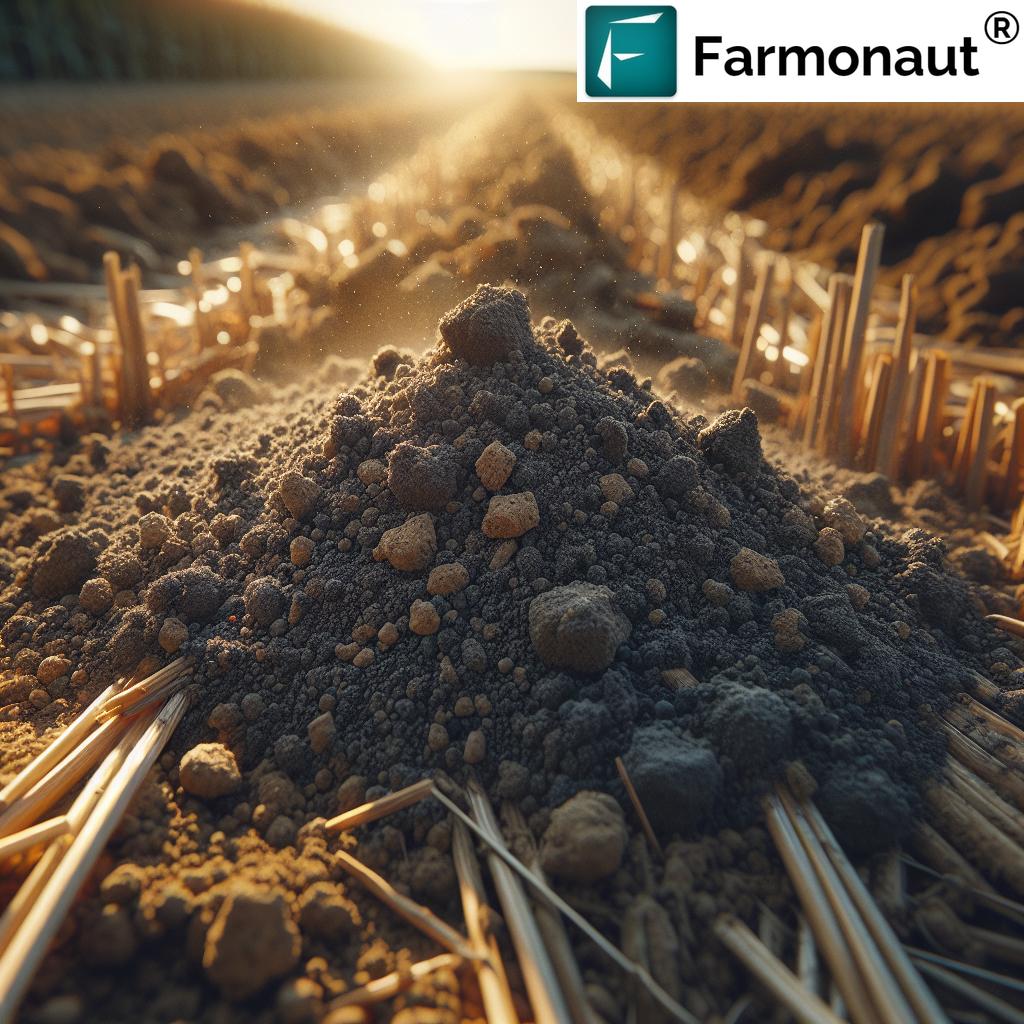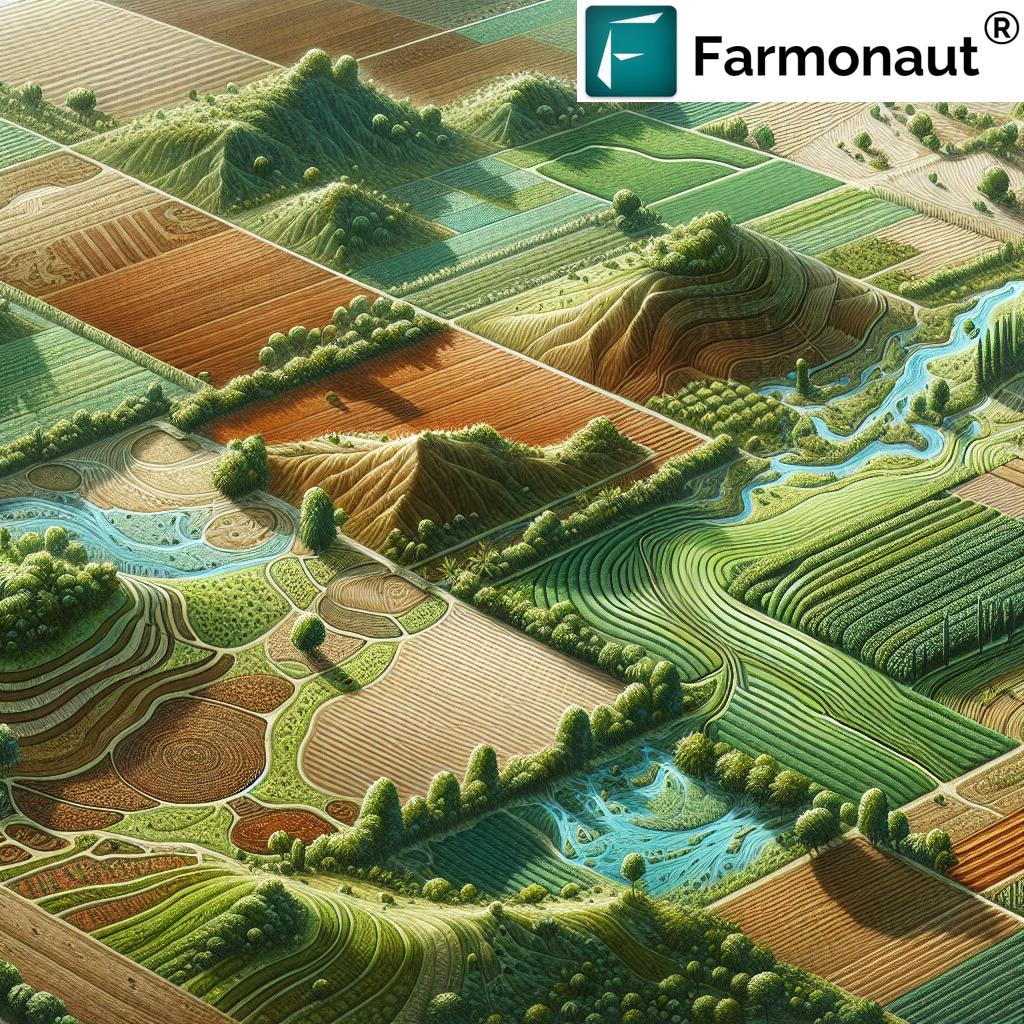Table of Contents
- Deforestation-Free Palm Oil: Paving the Way in 2025
- The Scale of Palm Oil Deforestation in 2025
- Environmental & Social Impacts of Palm Oil Deforestation
- What is Deforestation-Free Palm Oil?
- 2025 Deforestation-Free Palm Oil Brands & Impact Summary
- Leading Deforestation-Free Palm Oil Brands in 2025
- Deforestation-Free Palm Oil Products: What to Look For
- Innovations & Technologies Powering Change
- Farmonaut’s Role in Traceability & Monitoring
- Key Challenges Toward Deforestation-Free Palm Oil
- The Path Forward: Sustainability & Integration
- Frequently Asked Questions
- Conclusion: Deforestation-Free Palm Oil for 2025 and Beyond
- Farmonaut Subscription Options
“Over 86% of global palm oil in 2025 is projected to be certified deforestation-free, up from 19% in 2015.”
Deforestation-Free Palm Oil: Paving the Way for Sustainable Agriculture and Forestry in 2025
Palm oil is one of the most widely used vegetable oils globally, seamlessly integrated into thousands of everyday products — from food items like biscuits and chocolates to cosmetics, detergents, and even biofuels. Its popularity, high yield, and economic significance, especially in tropical countries like Indonesia and Malaysia, have made it a cornerstone of modern agriculture.
However, the rapid expansion of palm oil plantations has come at a serious environmental and social price. Deforestation due to palm oil has contributed to the destruction of some of the world’s most vital rainforests, loss of biodiversity, and the displacement of local communities. In 2025, the global attention is laser-focused on shifting this narrative — prioritizing deforestation-free palm oil brands and deforestation-free palm oil products that uphold sustainability, transparency, and responsibility.
This comprehensive guide delves into key facts and statistics, explores top brands, product categories, and the innovations shaping the environmental and forestry landscape in 2025.
The Scale of Palm Oil Deforestation in 2025: Key Facts & Statistics
To understand why deforestation free palm oil brands matter in 2025, it’s crucial to look at the scale of deforestation due to palm oil in recent years. According to the most recent palm oil deforestation statistics:
- Palm oil production still accounts for roughly 8–12% of global deforestation annually.
- Between 2010 and 2023, an estimated 3.5 million hectares of tropical rainforests—an area nearly the size of the Netherlands—were cleared for palm oil plantations.
- Indonesia and Malaysia are the leading palm oil producers, together generating over 85% of the world’s supply and shouldering most of the related environmental impacts.
Despite strong regulatory efforts and NGO advocacy, illegal clearing, weak enforcement, and complex supply chains have complicated the road to true sustainable agriculture.
Did You Know? The area of deforestation-free certified palm oil has rapidly increased in the last decade. This has resulted in more local communities keeping their forest resources, and a significant reduction in greenhouse gas emissions from land clearing in key tropical regions.
“More than 200 major brands committed to sourcing only deforestation-free palm oil by 2025, driving industry-wide change.”
Environmental & Social Impacts of Palm Oil-Driven Deforestation
The environmental impacts of palm oil deforestation reverberate far beyond the plantation borders. Here’s a breakdown of the core palm oil deforestation facts that every consumer and stakeholder should know:
- Greenhouse Gas Emissions: Deforestation and peatland drainage related to palm oil production contribute more than 500 million tonnes of CO2 to the atmosphere annually, accelerating climate change.
- Biodiversity Loss: The expansion of palm plantations fragments critical habitats for endangered species — including orangutans, Sumatran tigers, and rhinos — increasing their risk of extinction.
- Social and Community Impacts: Large tracts of land traditionally managed by indigenous populations have been cleared or occupied without proper consent, resulting in lost livelihoods and conflicts.
- Soil, Water, and Ecosystem Degradation: Intensive agricultural practices can lead to soil erosion, water pollution, and loss of natural ecosystem balance in tropical regions.
These impacts highlight why responsible sourcing and certification are gaining such rapid traction in 2025.
What Does “Deforestation-Free Palm Oil” Mean?
Deforestation-free palm oil signifies palm oil cultivated, harvested, and processed without larger-scale conversion or destruction of primary or secondary forest areas or other high-conservation value forests and peatlands. The criteria include:
- No new palm plantations established on virgin forests or land containing high carbon stock.
- No encroachment on peatlands or areas essential to carbon sequestration and biodiversity.
- Respect for indigenous rights, including free, prior, and informed consent in community land negotiations.
- Full traceability across the supply chain, backed by credible certifications such as RSPO (Roundtable on Sustainable Palm Oil), POIG, or NDPE (No Deforestation, No Peat, No Exploitation).
- Clear transparency in corporate commitments, monitoring, and independent audits for supply chain integrity.
Deforestation-free palm oil products thus guarantee that every step — from plantation to finished product — is aligned with internationally recognized conservation and sustainability practices.
2025 Deforestation-Free Palm Oil Brands & Impact Summary
Consumers, retailers, and business partners are now benchmarking palm oil brands and products on their deforestation-free credentials. The following table summarizes leading brands making tangible impacts in 2025, drawing from key palm oil deforestation statistics and sustainability disclosures.
| Brand Name | Estimated Production Volume (metric tons, 2025) | Certification Type | Geographic Source | Estimated Forest Area Preserved (hectares) | GHG Emissions Reduction (%) | Notable Sustainable Initiatives |
|---|---|---|---|---|---|---|
| Unilever | 1,000,000+ | RSPO, NDPE | Indonesia, Malaysia, West Africa | 285,000 | ~45% | Full traceability, real-time supply chain monitoring, and community prosperity programs |
| Nestlé | 800,000+ | RSPO Segregated, Free-From Deforestation | Malaysia, Indonesia, Latin America | 200,000 | ~40% | 100% sustainable palm oil sourcing, blockchain-based traceability pilots |
| Procter & Gamble (P&G) | 650,000+ | RSPO, NDPE, POIG | Indonesia, Malaysia, Brazil | 150,000 | ~35% | Satellite-based deforestation risk detection, farmer inclusion programs |
| Kao Corporation | 350,000+ | RSPO, NDPE | Southeast Asia | 90,000 | ~33% | Reduces water/chemical use, innovative supplier training modules |
| Ferrero | 260,000+ | RSPO Segregated, NDPE | Malaysia, Indonesia | 70,000 | ~37% | Full public traceability, community support projects, supplier mapping |
| The Body Shop | 90,000+ | RSPO, Fair Trade | Colombia, Brazil | 40,000 | ~25% | Smallholder empowerment, local livelihood partnerships |
Note: Data represents industry estimates, public reports, and 2025 projections. For the most current supply chain and certification information, check official brand communications and independent NGO assessments.
Leading Deforestation-Free Palm Oil Brands in 2025
With increasing consumer demand for responsible and deforestation-free palm oil products, top brands in the food, cosmetics, and household sectors have solidified their commitments for 2025:
- Unilever: Achieved full traceability and real-time supply chain monitoring. Integrates deforestation-free commitments across all product categories.
- Nestlé: 100% RSPO-Certified, with advanced blockchain traceability ensuring a deforestation-free supply.
- Procter & Gamble: Maintains strict zero-deforestation sourcing and progress reports on plantation impacts.
- The Body Shop: Leaders in personal care products, spotlighting smallholder inclusion and local livelihoods.
- Ferrero, General Mills, Danone: Other global food manufacturers that have made public commitments for deforestation-free sourcing and transparent reporting.
Additionally, many regional and boutique personal care and food brands are proactively publishing certifications and supplier lists to stand out among eco-conscious consumers.
Deforestation-Free Palm Oil Products: What to Look For
Consumers are more empowered than ever to make responsible choices. Here’s how to identify deforestation-free palm oil products across the market:
- Food Products: Baked goods, confectionery, ice cream, margarine, and snacks often contain palm oil. Look for “Deforestation-Free,” “RSPO Segregated,” or similar logos.
- Cosmetics: Shampoos, conditioners, soaps, and lip balms frequently use palm oil derivatives. Reputable brands disclose full supply chain transparency.
- Household/Personal Care: Detergents, cleaning agents, and creams should have clear certifications or proven sources.
- Biofuels: As sustainability rules expand, only deforestation-free palm oil is eligible for many low-carbon fuel incentive programs in 2025 and beyond.
Brands and retailers that publish supply lists, provide open audits, and display robust certifications are the best bet for truly sustainable palm products.
Farmonaut’s blockchain-based traceability solution offers an advanced and secure way for agricultural and food companies to guarantee product origin and supply chain integrity. By closing gaps in monitoring and providing immutable records, our platform empowers brands to meet consumer expectations for deforestation-free and transparent palm oil products.
Innovations & Technologies Driving Deforestation-Free Palm Oil in 2025
Technology remains a critical driver for deforestation-free palm oil brands and supply chains in 2025. Major breakthroughs include:
- Satellite Imagery & AI-Based Monitoring: Satellite platforms and AI analyze vast tropical regions to detect illegal clearing, providing real-time alerts for intervention.
- Blockchain-Based Traceability: Immutable, transparent supply chain data empowers brands and consumers alike. Farmonaut’s traceability API is a prime tool for integration into deforestation-free sourcing protocols. Explore the API here and view developer docs.
- Agroforestry & Mixed Cropping: Integrating oil palm with other crops and natural vegetation reduces land pressure and conserves biodiversity.
- High-Yield Varieties: Improved seeds and plantation management allow greater oil production on less land, reducing the need for new clearing.
- GIS & Supply Chain Analytics: Advanced data dashboards help companies assess risks across their supply networks and take swift remedial actions.
To achieve deforestation-free status in palm oil production, brands are increasingly investing in real-time farm monitoring solutions. For any organization seeking to integrate automated satellite-based monitoring and AI-powered advisory systems, our carbon footprint tracking and large-scale plantation management tools deliver actionable, cost-effective insights.
Farmonaut’s Role: Strengthening Traceability, Transparency & Responsible Agriculture
At Farmonaut, our core mission is to empower farmers, agricultural communities, businesses, and governments by making precision agriculture accessible, affordable, and impactful—especially critical for tropical crops like oil palm.
We are committed to supporting deforestation-free palm oil production through:
- Satellite-Based Crop Health Monitoring: Providing critical, real-time insights on plantation health, allowing for targeted resource usage and early detection of issues—vital for minimizing expansion into high conservation value areas.
- Jeevn AI Advisory System: Our AI-powered advisory solutions deliver weather forecasts, risk alerts, and management recommendations—boosting yield and sustainability for farmers worldwide.
- Blockchain Traceability: From plantation to shelf, we help organizations build transparent, deforestation-free supply chains that win consumer trust. Learn about our traceability solution.
- Carbon Footprinting Tools: Supporting emission-reduction goals with accurate carbon footprint monitoring and reporting.
- Resource & Fleet Management: Enabling efficient logistics and fleet solutions for plantations, lowering operational emissions and minimizing land-use risks.
By equipping stakeholders with actionable data, we contribute toward a future where palm oil production is not just profitable, but truly sustainable and forest-friendly.
Key Challenges Remaining in Achieving Deforestation-Free Palm Oil
Despite industry progress, several significant hurdles remain for full deforestation-free palm oil adoption in 2025:
- Smallholder Inclusion: Small-scale farmers supply nearly 40% of global palm oil, but often lack capital for certification, innovation, and ongoing compliance.
- Rising Global Demand: Increasing demand for palm oil in food, cosmetics, and biofuels may incentivize expansion into remaining forest areas—if controls are weak.
- Supply Chain Complexity: Multi-tiered networks allow unscrupulous actors to mix deforestation-linked oils into “clean” streams, undermining certification efforts.
- Enforcement & Governance: Illegal clearing still plagues certain regions due to gaps in local oversight and transparent reporting.
- Socioeconomic Pressures: Addressing community rights, fair compensation, and inclusive growth is essential to avoid social loss or conflict.
Solving these challenges requires innovation, trust, and cross-sector action from companies, NGOs, governments, and consumers.
Discover Farmonaut’s crop, plantation, and forest advisory for end-to-end sustainability, risk mitigation, and ROI improvement. Designed for organizations managing large-scale palm oil or mixed plantations, our platform fuses AI, machine learning, and satellite imagery for the most advanced insights available in 2025.
The Path Forward: Integrating Agriculture, Forestry & Sustainability for 2025 & Beyond
To truly decouple palm oil production from forest destruction, the global movement toward sustainable agriculture and deforestation-free products must converge around a set of core strategies:
- Landscape-Level Planning: Regional land-use plans that blend conservation, sustainable agriculture, and community development.
- Empowerment of Smallholders: By providing advisory systems, affordable tech, and access to financing (see Farmonaut’s crop loan and insurance verification), smallholders can better participate in deforestation-free supply chains.
- Corporate Accountability: Ongoing, independent verification and enforcement of public commitments—with clear penalties for violations.
- Smart Policy and Trade Regulation: National laws and international trade rules that restrict import of forest-linked commodities and reward sustainable sourcing.
- Consumer Awareness Initiatives: Education and marketing strategies that help consumers make informed choices about the daily products they use.
By integrating ethics, technology, and transparency, we pave the way for a world in which agricultural development goes hand in hand with forest conservation and biodiversity protection.
FAQ: Deforestation-Free Palm Oil, Brands & Products in 2025
What exactly is deforestation-free palm oil?
It’s oil produced from plantations that have not led to the clearing of primary/secondary forests, high conservation value lands, or wetlands, adhering to strict global standards for sustainability, traceability, and community rights.
How can I tell if a product contains deforestation-free palm oil?
Look for RSPO “Segregated” or “Identity Preserved” labels, “Deforestation-Free” seals, or clear public supplier lists. Many brands highlight deforestation-free sourcing directly on packaging.
Are all sustainable palm oil certifications deforestation-free?
No. Only certifications like RSPO’s highest tiers, NDPE pledges, and certain third-party audits guarantee true deforestation-free status. Always review the scope and rigor of the certification.
What actions can companies take to ensure deforestation-free supply chains?
Adopt real-time monitoring (like satellites and AI), implement blockchain tracking, enforce NDPE commitments, and regularly publish transparent progress reports.
How does Farmonaut support deforestation-free agriculture?
We provide digital tools for satellite crop monitoring, AI advisories, blockchain traceability, and carbon footprinting so that all stakeholders—from farmers to food companies—can produce, verify, and source truly deforestation-free palm oil.
Conclusion: Deforestation-Free Palm Oil Is Paving the Way for Climate-Smart Agriculture and Forestry in 2025
Deforestation-free palm oil is no longer a distant ideal but an emerging global standard guiding agriculture, forestry, and responsible consumerism in 2025. Driven by corporate commitments, innovations in monitoring, and global awareness, companies and communities are making measurable progress toward sustainable palm oil production.
The path forward relies on transparent supply chains, next-gen technologies, and vigilant enforcement—yet also on collaboration, education, and the power of consumer choice.
Together, we can ensure the products in our homes, pantries, and workplaces do not contribute to the destruction of the world’s precious forests but instead support local communities, preserve biodiversity, and enable a more sustainable future for all.
At Farmonaut, our unwavering focus is to empower this movement. With affordable and world-class solutions for real-time crop monitoring, traceability, and carbon accountability, we help keep farmers, companies, and consumers on the right path toward a deforestation-free, climate-smart world.
Get Started With Farmonaut: Scalable, Affordable Precision Agriculture for Deforestation-Free Goals
Join us in building a transparent, responsible, and sustainable future for palm oil and all agricultural production. Explore our large-scale plantation management solutions or get started with advanced traceability and monitoring on web, mobile, or API today!













